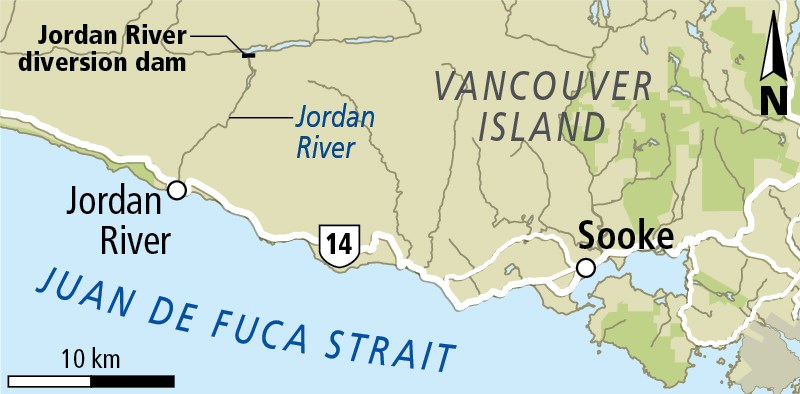B.C. Hydro is slowing down plans to buy 11 homes in Jordan River believed to be in danger of washing away if a major earthquake damaged an up-river dam, offering instead to buy them at fair market value whenever they become available.
Hydro’s re-evaluation means the Capital Regional District will reopen its popular beach in Jordan River for camping, said Juan de Fuca Electoral Area director Mike Hicks. “They’ve turned this from a nightmare for the residents and the campers into a totally responsible, fair and acceptable plan.”
In a letter to Jordan River residents this week, Chris O’Riley, B.C. Hydro deputy chief executive officer, said Hydro will purchase whenever residents want to sell. “Your property would be purchased by B.C. Hydro at the appraised estimated market value ignoring the possible effect of a major earthquake on the dam, and with the additional elements of compensation currently being offered to property owners,” the letter said.
“This includes reimbursement of moving costs, reasonable legal fees, property transfer tax on the purchase of a replacement property, mortgage pre-payment penalties and other disturbance damages incurred.”
In a move that outraged residents, Hydro approached the 11 Jordan River homeowners late last year with offers to purchase their homes. The offer came after the release of a six-year, $10-million study of all 79 B.C. Hydro dams in the province, which found that the Jordan River dam was the most likely to fail in an earthquake.
At Hydro’s request, the CRD suspended camping at Jordan River Regional Park.
But in a separate letter to the CRD, O’Riley said the camping ban is not necessary. “As a result of discussions with the Capital Regional District and new information provided by a third-party risk-assessment expert, we are now in a position to support overnight camping on land owned by the district within the evacuation area,” O’Riley said.
B.C. Hydro will continue discussions with the CRD about buying non-waterfront CRD land and will seek a prohibition on future development of waterfront land in the evacuation area. It will provide $150,000 for installation and maintenance of an emergency alarm or siren on the dam, O’Riley said.
He said the Jordan River dam is safe in normal circumstances and that there are no conditions that would be considered an imminent threat. But, he said, it is at risk in the event of a major to extreme earthquake. “Our goal is to reduce the number of permanent residents in this area and, over time, ensure there are no residences remaining.”
Hicks credited intervention by Bill Bennett, minister of Energy and Mines, and Opposition Leader John Horgan for the “corporate change of heart.”
“I think they realized with the public backlash against the no camping and [the fact] many residents don’t want to go, so they’ve had a second thought about it. I guess they’re willing to have their goal further on down the road,” Hicks said.
He said he expects the campground will reopen Friday.



